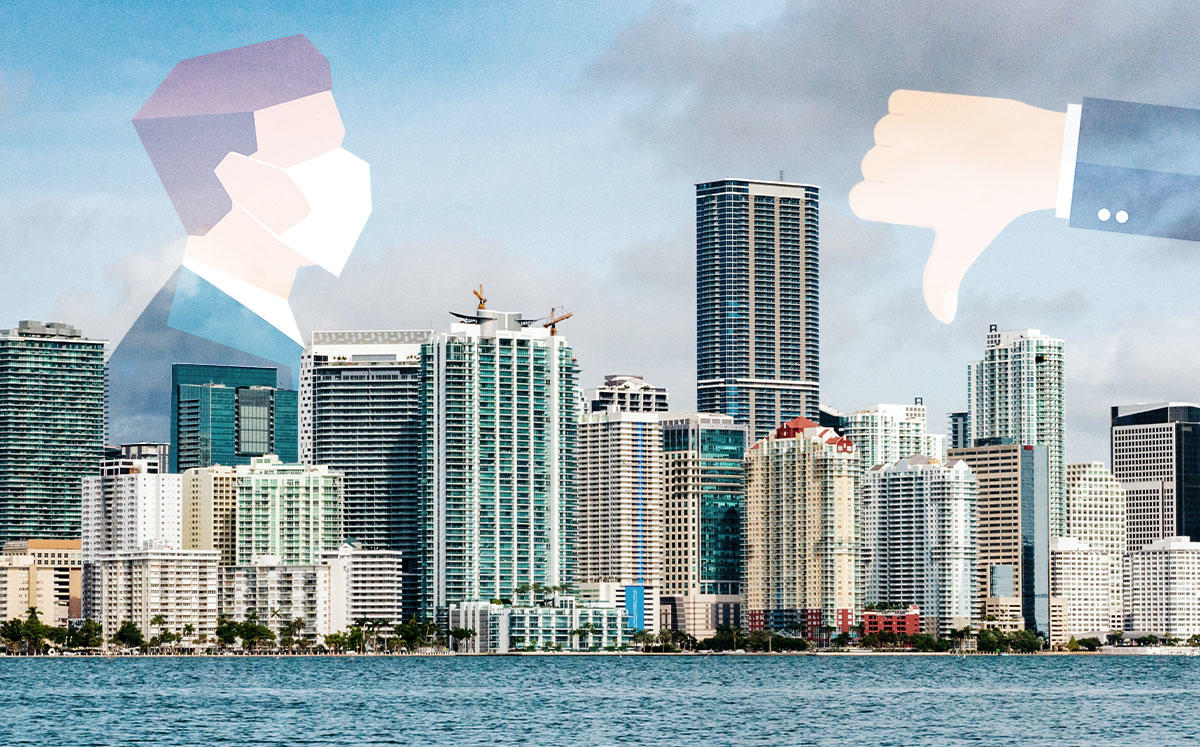Trending
South Florida real estate brokers begin to feel impact of coronavirus
Prospective buyers are hitting pause on commercial and resi deals

The owner of a multimillion-dollar condo in Miami Beach had his real estate agent cancel a showing last week. The reason? The prospective buyer, who was flying in from New York, was feeling under the weather.
“My client said he’s not permitted to enter the property,” said Douglas Elliman agent Bill Hernandez. “He said, ‘I’m very particular about who enters my property and where they’re coming from.’”
Hernandez, part of the Bill & Bryan Team, said that’s the first time he’s had that happen in his 16-year career. It happened about a week ago, before COVID-19, or coronavirus, was declared a pandemic. “I was a bit shell-shocked to be honest with you,” he said.
Across South Florida, residential, as well as commercial agents say they are concerned about how coronavirus will affect the market and ongoing deals.
Hernandez declined to identify his client or the unit, but said the prospective buyer was planning to tour other units in the building and neighborhood, which means his seller, a prominent New Yorker, may have lost the opportunity to sell to that buyer.
“Sellers are very concerned about who’s coming to their property. At the end of the day we’re talking about strangers,” he added.
Yet, Hernandez said that the coronavirus scare could also benefit sellers, if residents of densely populated areas like New York City accelerate their search for a home in the Miami market.
Gary Pohrer, an Elliman agent in Palm Beach, is listing a condo at One Watermark Place in West Palm Beach that has its own elevator, “so you’re not sharing it with a bunch of people.”
Generally, though, his clients are waiting to see what happens. Pohrer had a buyer coming to town, looking to purchase a house in the $7 million to $10 million range on the north end of the island, but he decided to pause his search for a month or two.
Another client was being cautious with their offer, and planned to use coronavirus to get a better deal. Pohrer, who canceled his trip to the Ellies in Uncasville, Connecticut in early March, said his clients are more concerned about their financial portfolios than about contracting the illness.
Coronavirus is impacting all facets of the industry, including the industrial market. Its effects on the financial markets, manufacturing and more, coupled with the fact that it’s an election year, may not bode well for sellers, some experts say.
Miami events, such as Ultra and Winter Music Festival, and eMerge Americas, have been postponed. The hotel market in the U.S. is taking a plunge due to booking and event cancellations. In the Miami/Hialeah market, occupancy fell by 9 percent, according to data from hotel research firm STR.
“It is literally the perfect storm for real estate that is not good for the market,” Hernandez said.
Danny Zelonker, commercial broker and owner of Z Miami Commercial RE Inc., is worried about institutional players taking a step back from the Miami market. “We’re in the 11th year of an up economy. Everything that goes up must come down,” Zelonker said.
He has two deals – a warehouse lease in Allapattah, and the sale of a warehouse in the east airport submarket – where the tenant and buyer are waiting to see what happens with coronavirus.
Commercial broker Lyle Chariff said he’s adding a state of emergency clause to all of his contracts, extending agreements if the president, governor or mayor declare a state of emergency.
Yet some real estate players say it is business as usual. Top luxury residential broker Jill Hertzberg, of Coldwell Banker, said her deals have not been affected. Hertzberg, part of The Jills Zeder Group, has a Sunset Island home under contract for nearly $14 million.
“In general I think people are cautious and careful right now. People are always concerned when the stock market hits a dip like it is, they want to be assured that they’re safe,” she said. “It’s going to take a couple of months to see where this goes.”
Co-working operator Büro, which has six locations in South Florida, hasn’t felt a financial impact from coronavirus, according to owner Michael Feinstein.
He said on Tuesday that new management deals in the works have not been impacted. Büro members are “still coming to the office” and Büro has enhanced its cleaning practices of common areas and bathrooms and installed Purell dispensers.
Similar to property management companies, landlords and most offices in markets impacted by coronavirus, Büro sent out an email to its members on Monday informing them of the measures.
Feinstein expects buyers across all asset classes to be cautious. “When there’s uncertainty in the market,” he said, “people are less likely to pull the trigger.”




